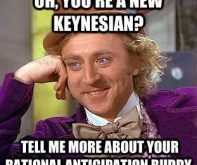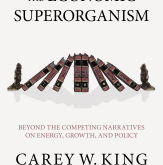from Lars Syll There really is something about the way macroeconomists construct their models nowadays that obviously doesn’t sit right. In mainstream economic theory models largely function as a substitute for empirical evidence. One might have hoped that humbled by the manifest failure of its theoretical pretences during the latest economic-financial crises, the one-sided, almost religious, insistence on axiomatic-deductivist modelling as the only scientific activity worthy of pursuing...
Read More »“How’s the economy doing?”
from Ken Zimmerman (originally a comment) If you had asked somebody 100 years ago, ‘How’s the economy doing?’ they would not have known what you were talking about. At the time, people talked about things like banking panics, and national wealth, and trade. But, according to Zachary Karabell, this thing we call the economy — this thing that we constantly measure with specific numbers — was not really invented until the 20th century. Specifically, around 1930. “It was invented because of...
Read More »Confusopoly
from Ikonoclast (originally a comment) I think I can give an example of why economic reductionism or economic simplism or economism do not work. It revolves around the fact that the world, even the socioeconomic world, is extremely (if not infinitely) complex and endlessly changing and mutating. There are numerous gradations and changes to every phenomenon possible. About 25 years ago, I commissioned a house to be built. About 25 weeks ago I commissioned a landscape (hardscape and...
Read More »The problem of reductionism in economics
from Lars Syll The kinds of laws and relations that economics has established, are laws and relations about entities in models that presuppose causal mechanisms being atomistic and additive. When causal mechanisms operate in the real world they only do it in ever-changing and unstable combinations where the whole is more than a mechanical sum of parts. If economic regularities obtain they do it (as a rule) only because we engineered them for that purpose. Outside man-made “nomological...
Read More »It matters for inequality if top executives are ripping off their companies
from Dean Baker As can be easily shown the bulk of the upward redistribution from the 1970s was not due to a shift from wages to profits, it was due to an upward redistribution among wage earners. Instead of money going to ordinary workers, it was going to those at the top end of the wage distribution, such as doctors and dentists, STEM workers, and especially to Wall Street trader types and top corporate management. If we want to reverse this upward redistribution then we have to take...
Read More »The social question
from Peter Radford If you were to ask me what the greatest intellectual error of the past fifty years has been I wouldn’t hesitate. Shareholder value. It’s an easy response. Yes, it reflects my own curious interest in the fundamentals of business and its intersection with economics, but it is also emblematic of so much more. Derived as it is from the wrong turn in economics and politics in the middle of the last century it carries with it so many of the ill founded ideas that have...
Read More »The permanent income hypothesis
from Lars Syll Almost all mainstream macroeconomic theories are based on Milton Friedman’s permanent income hypothesis (PIH). It is mostly used in formulating the consumption Euler equations that make up a vital part of ‘modern’ New Classical and ‘New Keynesian’ macro models. So, what’s the problem with PIH? Well, only that empirical evidence have — again and again — falsified it! One implication of PIH is that current consumption is modelled as not being influenced by predictable changes...
Read More »The production and distribution of Covid-19 vaccines has exposed and intensified global inequality.
from Jayati Ghosh This led to the rapid development of multiple Covid-19 vaccine candidates and even more rapid regulatory approval to several of them. Typically, vaccines take several years to be developed and approved, partly because of extended clinical trials to check for all possible responses. But some Covid-19 vaccine candidates were given official approval in Russia and China even before the essential Phase III trials were completed. Even in the US and Europe, regulatory...
Read More »Countries’ positions on waiving monopolies for COVID-19 medical tools
Source: Medecins san Frontiers, accessed 21 February 2021
Read More »A review of Carey King’s ‘The Economic Superorganism’
from Blair Fix If you are interested in the megatrends of the 21st century, then Carey King’s new book The Economic Superorganism should be on your reading list. It is a well-written, meticulously researched opus on how to understand the sustainability problems that face humanity. In many ways, the book covers well-trodden ground. King is an engineer who is trained in the systems thinking pioneered by MIT engineers Donella and Dennis Meadows. (The Meadows’ book The Limits to Growth was...
Read More » Real-World Economics Review
Real-World Economics Review






